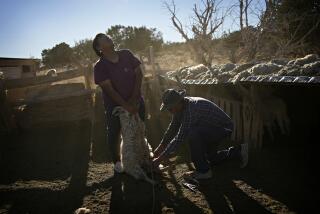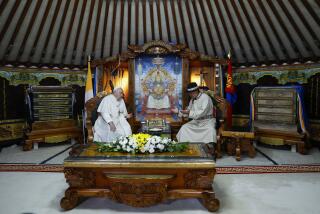Herders Face an Uncertain Future : Mongolia: The nation seeks to increase its links with the outside world. An invasion of tourists and a return to capitalism could severely alter the traditional lifestyle.
- Share via
ERDENE, Mongolia — Rinchinsanbuu and his family stood proudly beside their white herder’s tent, sheep grazing nearby. He could envision no better life.
“I take care of 100 cows and 300 sheep,” said Rinchinsanbuu, 51. “I have 15 children. I have spent my life in the countryside. I want to stay as a herdsman.”
Herdsmen, and with them Mongolia’s cultural legacies, face an uncertain future.
Mongolia once was a nation of nomadic herders, but fewer than 40% of its 2 million people now herd their horses, sheep, cattle and camels across the vast Central Asian steppe.
Those who remain herders, like Rinchinsanbuu, are constricted by the borders of state farms and agricultural cooperatives, which have owned most of Mongolia’s livestock since the communists took over in 1921.
New democratic parties that recently won a voice in government want to give the animals back to the herdsmen and allow freer grazing. That, plus the concern of the new parties for reviving traditional culture, would reinforce the old ways.
Both the new groups and the Communist Party, however, also want to increase Mongolia’s links to the outside world, attract foreign investors and tourists, and introduce modern technology.
In addition to restricting the herdsmen, communism also cushioned them from modernity by stunting overall economic growth. It is impossible to predict how the herding lifestyle will survive a return to capitalism and the expected invasion of Japanese tourists and Hong Kong television.
The culture of Mongolian cities already is largely imported.
Most young people wear Western clothes, and horses have given way to motorbikes, cars and buses. Television, ballet, video parlors and rock concerts provide entertainment for urban office workers.
For Rinchinsanbuu and his family, life still follows a traditional outline.
“I get up at 5 a.m. and sleep at midnight,” he said. “I could even say I work 25 hours a day.”
He looks after 100 cattle and 300 sheep for the Tuya Agricultural Cooperative and has 50 sheep, cattle and horses of his own.
At least three times a year, he and his family dismantle their three round tents, called gers , pile their possessions on a horse-drawn cart and move to new pastures.
They cook their meals on wood-burning stoves whose pipes project from the tops of the gers , sending thin streams of smoke into the wide blue sky.
Every now and then, they slaughter a sheep for food, but most of the time they eat boiled mare’s milk or strong-tasting cheese, and bread with fresh butter or dried curds.
Entertainment generally means listening to the radio, but there are several festivals each year that feature Mongolian wrestling, horse racing, archery and singing.
Herders preserve traditional courtesies. When unexpected visitors stopped at his summer camp on a hillside 35 miles east of Ulan Bator, the capital, Rinchinsanbuu donned his best del , an outer garment closed with a wide, colorful sash at the waist.
While his wife served milk tea, he solemnly handed a snuff bottle around.
Rinchinsanbuu and his good friend Dashnyam laughed when asked if it would not be easier to live in a city and work in a factory.
“Of course city life is quite good, because these city residents can have anything they want in a department store,” Dashnyam said. “But I think we are rich. We have more fresh air, more meat. Country life is healthy.”
By another measure, the herders are poor. According to the government, the average herder working for a cooperative earns about 3,340 tugriks a year, less than $600 even at the artificially high official exchange rate.
Sanitation is abysmal. Flies are abundant and outhouses are crude.
Rinchinsanbuu is relatively wealthy. He and his grown sons own a generator, which are few and expensive, and three televisions, which are rare outside cities.
Ichinkhorloo, a yak herder camped across the stream, said he wanted electricity because “it is very difficult to live without light, and there is a shortage of candles.” Ichinkhorloo said he also wanted more pay, “maybe 300 to 400 tugriks a month.”
Ochir, an 80-year-old camped several miles away, said he wanted a bigger pension. He gets 60 tugriks a month, about $10, and must continue raising sheep because it is too little to live on.
Like many of the older herders, Ochir hesitated to blame the Communist Party for the poor economic conditions.
“I have supported this party from my childhood,” he said. “I don’t know about these new parties. We don’t know who they are.”
In places where the new parties campaigned extensively, the July 29 election showed herders can be open to change.
A good example was the Gachuurt State Farm just outside Ulan Bator, where a Communist ran for the national legislature unopposed. Voters rejected him and a new election is being scheduled.
More to Read
Sign up for Essential California
The most important California stories and recommendations in your inbox every morning.
You may occasionally receive promotional content from the Los Angeles Times.













